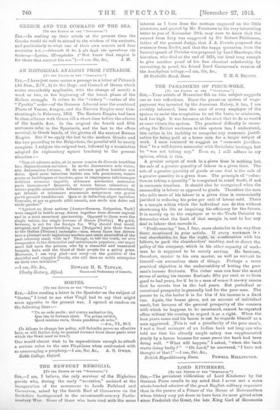AN HISTORICAL ANALOGY FROM PETRARCH. [To TH E EDITOR OF
TUN to Ear atoa.") SIR,—I have just come across a passage in a letter of Petrarch (Ad Pant., XIV., 5) to the Doge and Council of Genoa which seems remarkably applicable, with the change of merely a word or two, to the beginning of the latest phase of the Balkan struggle. It refers to the " victory "—rather of the "Pyrrhic" order—of the Genoese Admiral over the combined Fleets of Venice, Aragon, and the Eastern Empire near Con- stantinople in February, 1352. The Eastern Empire had been in close alliance with Genoa till a short time before the advent of the hostile fleet. In the original the fourth and fifth sentences refer to the Spaniards, and the last to the effete survival, in Greek hands, of the glories of the ancient Roman Empire. But if we apply the last to the modern Greeks and the two preceding to the Bulgarians, the parallel will be nearly complete. I subjoin the original text, followed by a translation adapted (in explanatory square brackets) to the present situation :--
"Tree ab adverse acies, at in unum coactre de divorsis tractibus tree disjunetissitnte nationes. In medio Januensiurn soles virtue, solo. Januensium fortune,. Et de externis quidem hostihus non doleo. Quid enim laboribus italicis sea tele permiscent, venal*, genus ac loalifragum at insolens, quota in longinquain infeticeruque militiam nummus inipellit, nobisoum solemniter contractile peels imrnemores P Quamvis, ut vermin fatoar, calamitoso at misero pepello misericordia debeatur: principibus suecensendum, qui infando at inhumane oommeroio eanguinem sure gentle pare& pecunill vendiderunt. Quin et do fallacibus atquo inertibus Grreculis, at per se grando nihil ausuris, non motto non doled sed valde gaudeo."
"Against us, three nations [Austro-German, Bulgarian, Turk] were ranged in battle array, drawn together from diverse regions and in a most unnatural partnership. Opposed to them were the single valour, the single fortune of Genoa [Serbia]. My grief, bowovor, is not for the foreign foe. Why should that venal, arrogant, and league-breaking race [Bulgaria) join their forces to the Italian [Teuton) imbroglio—men, whom lucre line driven into a (distant and) inglorious warfare and made Unmindful of the pact soletuuly made with us P Though, to tell the truth, we owe compassion to the distressful and unfortunate populace; our anger must fall upon the princes, who by a shameful and unnatural bargain, have sold the blood of their people for a paltry price. Moreover, I am very glad—not sorry—at the position of the deceitful and sluggish Greeks, who will dare no noble enterprise on their own initiative."
am, Sir, &43., EDWAIlD H. R. TATHAM,






































 Previous page
Previous page